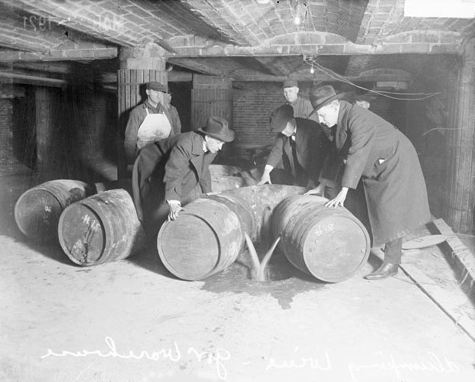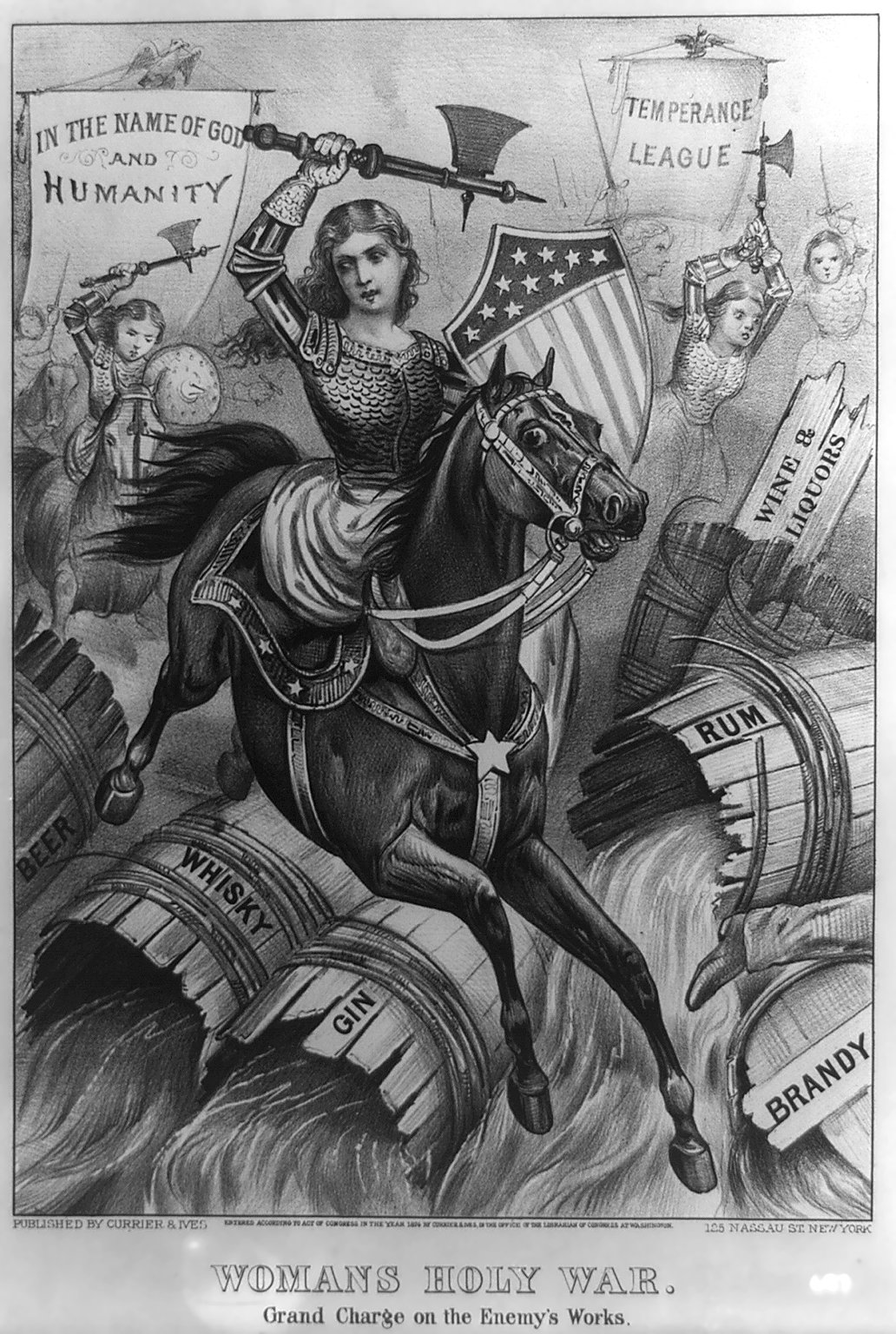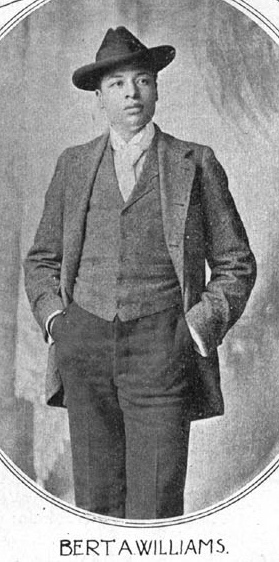Prohibition
Prohibition agents destroying barrels of alcohol, 1921

 Cross-Link: Prohibition Era Songs of Reform Primary SourceLearning Plan
Cross-Link: Prohibition Era Songs of Reform Primary SourceLearning Plan
In 1919, the United States passed the 18th Amendment prohibiting the manufacture, sale and transportation of alcohol.
Prohibition was repealed by the 21st Amendment in 1933
 Ken Burns' Prohibition trailer on YouTube
Ken Burns' Prohibition trailer on YouTube
- Click here for a picture gallery on Prohibition from the Discovery Channel.
- Click here for the website "The Lawless Decade". Companion site to the book by Paul Sann. A pictorial history of the time.
- Click here for a short video overview of Prohibition from the History Channel.
Click here for People of the Prohibition
For a brief overview of the topic, see Unintended Consequences by Michael Lerner from the Ken Burns Prohibition website.
 The history of Prohibition is discussed in Last Call: The Rise and Fall of Prohibition by Daniel Okrent (Scribner, 2010). Among the key points presented in the book:
The history of Prohibition is discussed in Last Call: The Rise and Fall of Prohibition by Daniel Okrent (Scribner, 2010). Among the key points presented in the book:
- Alcohol was the nation's fifth largest industry at the time.
- Advocates of prohibition were known as “drys.” They appealed to white Protestant morals, arguing that alcohol consumption led to sinful behavior (such as promiscuity).
- The Anti-Saloon League was a major force in American politics from 1893 to 1933. Through both printed word and lobbying, the League turned its moral crusade against alcohol into a fight for a Constitutional amendment.
- A unique combination of organizations and individuals supported prohibition: "Simply put, racism, progressivism, populism, suffragism, and nativism spiked with a pungent dose of anti-popery" ("When America went on the wagon," Katherine A Powers, Boston Sunday Globe, K7).
- American entry into World War I was decisive factor because it created a wave of anti-German hysteria, some of which was directed toward brewing companies owned by individuals of German origin.
- The 16th Amendment(1913) that established the graduated income tax gave the federal government a means to make up for the lost of revenue that Prohibition would create by eliminating the tariff on alcohol.
 The Volstead Act and Related Prohibition Documents
The Volstead Act and Related Prohibition Documents
 Learning plan on Prohibition from Stanford History Group.
Learning plan on Prohibition from Stanford History Group.
Though it slowed a bit, consumption of alcohol in the United States did not stop.
- On the contrary, Prohibition served to create an underground culture of illegal liquor production and consumption.
- The ban also corresponded with a rise in organized crime , as mobsters took great advantage of the growing underground network.
- The city of Detroit had more than 20,000 speakeasies, one for about every 30 adults, and illegal alcohol was the city's second-largest industry, next to auto manufacturing.
"Woman's Holy War. Grand Charge on the Enemy's Works." Political Cartoon, 1874

As historian David Oshinsky noted in "Temperance to Excess" (The New York Times Book Review, May 23, 2010, p. 20), the "accompanying laws. meanwhile, provided enough loopholes to guarantee failure. Sacramental wine was permitted, allowing fake clergymen to lead bogus congregants in non-religious romps. Farmers who fermented their own cider and "fruit juices" were given special exemptions. . . . Doctors, dentists, and even veterinarians were free to write prescriptions for remedies like "Richardson's Concentrated Sherry Wine Bitters," which contained 47.5 percent alcohol (95 proof). In the 20s, Charles Walgreen expanded his drugstore chain from 20 stores to an astounding 525—a spurt ludicrously attributed to his introduction of the milkshake."
The Temperance movement was strongly linked with the Women's movement in the United States.
- Alcohol was directly linked to domestic abuse, health problems, poverty and other issues that directly affected women.
The Women's Christian Temperance Union organized women in their fight against alcohol.
 Carrie Nation
Carrie Nation
Carrie Nation was one of the boldest figures to come out of the Temperance movement: the 6-foot-tall woman was well-known for attacking places that sold alcohol with a hatchet.
Click here for an expanded biography of Carrie Nation
Click here for a video on Carrie Nation.
Bootleggers: people producing and selling alcohol illegally (learn the origin ). Speakeasies: illegal, underground bars (learn the origin )
 Women Bootleggers and Women Prohibition Agents describe the role of female bootleggers as well as some of the most famous ones.
Women Bootleggers and Women Prohibition Agents describe the role of female bootleggers as well as some of the most famous ones.
Visit here for the 18th Amendment and other related documents leading to Prohibition.
 Prohibition and Music
Prohibition and Music
See Ken Burns Prohibition film website for an overview of music in 1920s, including the songs Prohibition Ramble and Prohibition Bounce
For a more background and context, see Paramount Records: The Label Inadvertently Crucial to the Blues, from NPR (November 2, 2013).
Bert Williams, 1896

Music Protesting Prohibition
In 1919, Irving Berlin wrote the song Prohibition to protest the nation's ban on alcohol.
- Bert Williams was the largest selling Black singer before 1920 and the first African American to record for a major record company. Go here for the song on YouTube.
Music Favoring Prohibition and Temperance
“A Prohibition Rap” by bob maloy
Prohibition, Prohibition
Banning alcohol became the nation's mission
Keeping people from their own volition
Working to legislate inhibitions.
Powerful force was Carry Nation
Upset about intoxication
Too many on a booze vacation
Public not really concentrating.
Started off with the Volstead Act
0.5 became a fact
Anti-Saloon League led the attack
18th Amendment gave life a different tact.
Alcohol was underground
Organized crime gained renown
Speakeasies easily found
Bootleggers ruled the town.
Politics was Drys vs. Wets
Enforcing the law rarely met
Mafia got all it could get
Making home-brew was a good bet.
Democrats sought repeal
Republicans left afield
Income tax was government’s next meal
Roosevelt’s pen made a new deal.
Prohibition, Prohibition
Banning alcohol failed as a mission
Can’t keep people from their own volition
No need to legislate inhibitions
Comments (0)
You don't have permission to comment on this page.